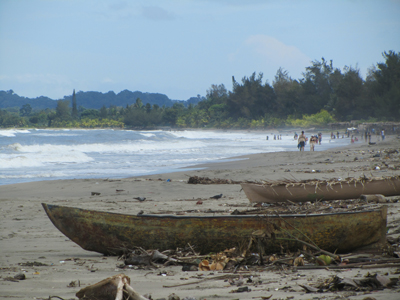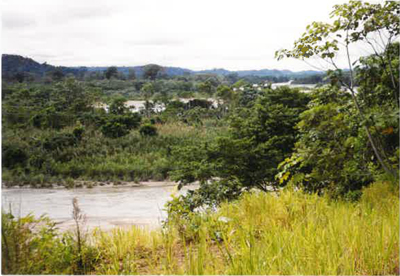Geographic grounding
Place, direction and landscape in the grammars of the world.
Conference at the University of Copenhagen, 30-31 May 2016.
Aims and background
Confirmed invited speakers
Program and abstracts
Subjects
Themes and questions
Organizers
References
Practical information
Aims and background
The languages of the world offer their speakers different means of encoding location information and of grounding utterances spatially by pointing to the surrounding landscape. Languages vary both in the spatial concepts they require their speakers to hold and in the degree of routine attention to landscape they demand. Psycholinguistic experiments have examined the influence of cross-linguistic differences in spatial language on spatial cognition, while on the other hand, ethnophysiographic and ethnosyntactic studies have investigated the effects of geography and culture on spatial language. There is a now a wealth of findings from different spatial linguistic subsystems in many languages (Frames of Reference, topological relation markers, locative predicates, landscape terms, toponyms), and one aim of this conference is to investigate cross-linguistic tendencies in the ways such spatial subsystems play together within single languages. Another aim is to examine the usefulness of the ethnophysiographic model suggested for landscape terminology (Turk et al. 2011) when applied to other aspects of spatial language, such as spatial conjugations.
We invite contributions addressing the following three broad themes: The theme Coding strategies covers cross-linguistic variation and preferences in presenting place and direction information as either foreground or background information (lexical vs. grammatical), as core or periphery (argument vs. adjunct) and as independent or fused with other types of meanings (dedicated morphemes vs. portmanteaus). For the theme Dependencies across subsystems we encourage studies of the ways different parts of grammar and lexicon expressing location and direction either reinforce each other (supporting similar concepts and distinctions across scales and domains) or supplement each other (division of labour). Finally, with Place-marking systems as parts of ecological and cultural niches, we zoom out to the relationships between linguistic strategies for spatial reference and grounding, the landscapes these strategies are used in and the speech communities they serve, asking also whether their underpinning by traditional landbased practices makes them especially vulnerable in language endangerment contexts.
Confirmed invited speakers
Niclas Burenhult
Program
Find the program and abstracts at this page.
Subjects
We encourage proposals including, but not limited to the following subjects:
- Grammatical vs. lexical expression of spatial information
- Location and direction in portmanteau morphemes
- Associated motion/path
- Location in micro- vs. macroscale
- Parallels between marking of position in space and time
- Endangered location-marking systems
- Location-marking systems in revitalization contexts
- Direction use in translocated languages (migration, forced movement)
- Shifted directions as evidence of historic migrations
- Experiments with non-linguistic conceptualization of landscape
- Acquisition of location markers
- Space-marking co-speech gesture
- Semplates
- Toponyms and landscape terms
- Positional verbs
- Ethnosyntax
- Location marking and land-based practices (ritual, subsistence)
- Landscape entities in mythology (agency, grounding)
Themes and questions
The three themes of the conference 1) Coding strategies, 2) Dependencies across subsystems and 3) Place-marking systems as parts of ecological and cultural niches can be addressed with a series of questions presented at this page.
Organizers
Organized by The Linguistic Circle of Copenhagen and Department of Nordic Studies and
Linguistics.
Organizing committee
Ditte Boeg Thomsen, University of Copenhagen, ditte.boeg@hum.ku.dk
Jan Heegård Petersen, University of Copenhagen, janhp@hum.ku.dk
Steffen Haurholm-Larsen, University of Bern, steffen.haurholm-larsen@isw.unibe.ch

References
Go to this page for references.
Practical information
Go to this page for practical information.

